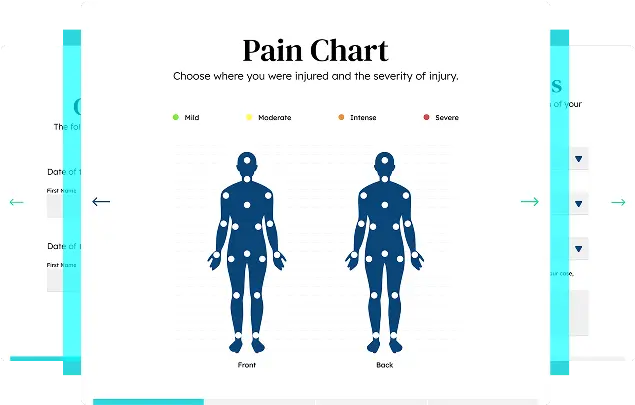Boston Dog Bite Attorney
Dog bites are unfortunately common in Boston and can result in serious physical and emotional trauma. If you or your child has been bitten, an experienced Boston dog bite lawyer can ensure your rights are protected and that you receive justice and financial compensation.
Get Free Advice About The Compensation You Deserve
Home » Boston Personal Injury Lawyer » Boston Dog Bite Attorney
Reviewed by: Christopher DiBella
November 24, 2025
On This Page
- Dog Bites in Boston: A Serious Concern for Public Safety
- Understanding the Massachusetts Dog Bite Law of Strict Liability
- Understanding the Medical and Psychological Impact of Boston Dog Bites
- Legal Recourse and Potential Damages Associated with Your Boston Dog Bite Case
- Post-Bite Care, Emotional Impact, and Legal Steps To Take After a Boston Dog Bite
- Protecting Children from Dog Bites: Prevention and Immediate Response
- Boston’s Top Dog Law Expert
- Contact an Experienced Dog Bite Injury Lawyer in Boston
- If you or your loved one is bitten or injured by a dog, you may be entitled to damages under strict liability laws.
- Compensation may include medical expenses, reconstructive surgery, psychological trauma, and scarring.
- DiBella Law has a strong record in animal bite cases, using local knowledge to ensure full recovery and protection of your rights.
Having a knowledgeable and dedicated legal advocate on your side can make all the difference in your case. At DiBella Law Injury and Accident Lawyers, we have extensive experience handling dog bite cases and are committed to guiding you through the legal process with compassion and expertise. Whether you’re dealing with physical injuries, emotional trauma, or insurance companies that try to downplay your case, we are here to protect your rights and fight for the compensation you deserve.
Call our Boston personal injury lawyer team today for a free consultation.
Our Case Results
At DiBella Law, we have a proven track record of success in dog bite cases. Here are just a few examples of the favorable outcomes we’ve secured for our clients:
$27,500 Settlement for Amazon Driver Attacked by Vicious Dog
An Amazon driver was viciously attacked by an aggressive dog while delivering a package. Our team fought for fair compensation, securing a $27,500 settlement for the driver’s medical expenses, lost wages, and pain and suffering.$25,000 Settlement for Young Woman Attacked by Unrestrained Dog During Job Interview
A young woman was bitten by an unrestrained dog during a job interview. We worked diligently to secure a $25,000 settlement to cover her medical costs and the emotional trauma caused by the attack.
Dog Bites in Boston: A Serious Concern for Public Safety
Boston is a great city for people to enjoy a walk or outdoor playtime with their dogs. Places like Boston Common and Carleton Dog Park are full of Bostonians spending time with their furry friends; however, it is not always fun and games.
According to the city of Boston, Boston Public Health Commission receives over 300 reports of dog bites each year. Many of the victims are children, and most of these bites do not come from aggressive dogs but from scared or startled dogs. However, the dog’s owner can still be held liable.
We understand that a dog bite can be traumatic for victims. This is especially true when the victim is a child. Parents may be concerned about the immediate injury, long-term implications, the possibility of disfigurement, and emotional trauma.
Understanding the Massachusetts Dog Bite Law of Strict Liability
As a part of the Commonwealth of Massachusetts, Boston follows the practice of strict liability. This means dog owners are responsible if their dogs bite someone. The victim does not need to prove negligence on the part of the dog’s owner.
Even if the owner has the dog on a leash or confines it in a fenced yard, they are still responsible for the damage the dog causes if it escapes.
According to Massachusetts General Laws Chapter 140 §155, the dog’s owner is not held responsible in the following instances:
- The victim was teasing, provoking, or abusing the dog
- The victim was trespassing when bitten
- The victim was committing a crime when bitten, such as assaulting the dog’s owner
Understanding the Medical and Psychological Impact of Boston Dog Bites
Medical care after any Boston dog bite can be expensive, especially if the victim is a child. Facial bites often require plastic surgery to avoid permanent scars. Wounds to extremities such as hands or legs can cause lifelong nerve damage or loss of use.
Though this only happens in severe cases, it’s not unheard of for dog attack wounds to need complicated reconstructive surgeries along with extended medical care. In some instances, injuries inflicted in a dog attack are so catastrophic that they result in permanent disfigurement or wrongful death.
Some of the most common Boston personal injury claims involving dog bites include:
- Muscle and nerve damage: Dog bites can puncture deep enough to damage the tissue underneath a victim’s skin. Nerve injuries can significantly hinder movement and, in severe cases, cause paralysis of damaged limbs and wounded areas.
- Infection: If a dog breaks your skin with its claws or teeth during an attack, dangerous bacteria can be transferred into the wounds. When pathogens enter an injury, the site can become vulnerable to infection. Symptoms of infection include redness, swelling, and pus discharge.
- Scarring: While some wounds fully heal with the appropriate medical care and time, animal bites often leave lasting scars. While plastic surgery can help, scars remind you of the horrific bite attack you endured and may affect your quality of life.
- Broken bones: If a dog gets a firm grip on a body part, it can easily break bones with its jaws. Fractured or broken bones will hinder your ability to perform simple physical acts, including doing your job, which can lead to a loss in wages.
In addition to the physical damage dog attacks cause, victims frequently experience post-traumatic stress disorder (PTSD). The psychological trauma of an animal attack can be just as detrimental as the injury itself.
We’ve offered crucial support and guidance to individuals who have suffered injuries, ensuring their financial and emotional well-being.
Legal Recourse and Potential Damages Associated with Your Boston Dog Bite Case
After a dog attack, a qualified personal injury lawyer will investigate the incident to determine liability and negotiate with homeowner’s insurance adjusters and other involved parties. Your attorney can file a dog-bite lawsuit and fight for you in court if the insurance company refuses to give you a fair settlement.
Recoverable damages in a Boston bite injury claim or lawsuit may include the following:
- Medical expenses: This category covers all medical treatment associated with the injury, including hospitalization, surgeries, medications, and rehabilitation.
- Lost wages: You may be entitled to reimbursement for your lost income due to time off work while recovering from your injury.
- Pain and suffering: This damage often includes compensation for the physical and emotional discomfort from the dog attack.
- Scarring and disfigurement: You may be entitled to additional compensation for visible scars or disfigurement caused by the dog bite that may impact your self-esteem.
- Property damage: You could seek compensation for your personal belongings damaged during the dog attack, such as torn clothing or accessories.
- Psychological injuries: Dog bite victims may be entitled to compensation for therapy or counseling expenses to cope with the incident’s emotional trauma and psychological effects.
- Punitive damages: In cases of intentional harm or extreme negligence, punitive damages may be awarded by the court to punish the responsible party and make an example of them.
- Wrongful death damages: If the dog bite leads to the death of a loved one, surviving family members may be eligible for compensation for funeral expenses and loss of income and companionship.
Every situation is unique, but one of our experienced dog bite lawyers can evaluate your case and tell you which damages you are likely to recover in a dog bite claim or personal injury lawsuit.
Get immediate case evaluation with no cost or obligation to you in less than 5 minutes.

Post-Bite Care, Emotional Impact, and Legal Steps To Take After a Boston Dog Bite
Even when a dog bite is properly cleaned, it has a greater chance of infection than other types of wounds. Watch for swelling, tenderness, and oozing. Check for fever or chills regularly. If any of these symptoms appear, get immediate medical care.
Children are more likely than adults to suffer from emotional distress after a dog attack. Seek the help of a trained counselor if your child has nightmares or fear of dogs after being bitten.
Once your loved one is safe and receiving medical care, the next step is to contact a Boston dog bite injury attorney to schedule a free consultation. Knowing your rights and how to seek compensation from the negligent pet owner can relieve your concerns over this traumatic event.
Protecting Children from Dog Bites: Prevention and Immediate Response
Most children are curious about animals and want to touch or play with dogs, especially if they have one as a family pet at home. Children don’t understand that dogs vary in temperament; many are fearful or easily agitated and can lash out. Adults should remain vigilant when a child is around any dog, especially a large one.
Due to the smaller size of young children, wounds tend to be on the face, head, and neck, making them much more serious than a bite to an adult. Even a “minor” bite should be examined by a medical professional. If you witness a child being bitten by a dog, immediately move the child to a safe location and call 911 if the injury is serious.
Apply a clean cloth or towel to control bleeding and remain with the child until help arrives. Have someone follow the dog and try to get a picture of it to contact the dog’s owner. A dog bite can cause serious complications, so a medical evaluation is always important.
Seeking prompt medical attention will also create a medical record connecting the incident to your child’s injury.
Boston’s Top Dog Law Expert
At DiBella Law Injury and Accident Lawyers, we are recognized as the top dog law experts for dog bite cases, dedicated to securing justice for victims of these traumatic incidents. Our experienced legal team understands the complexities of dog bite laws, including owner negligence, leash requirements, and liability statutes, and we leverage this expertise to fight for maximum compensation.
For example, we recently secured a $70,000 settlement for an elderly man who was severely injured in a dog bite attack. Whether dealing with severe injuries, emotional trauma, or financial burdens caused by medical expenses and lost wages, we pursue every avenue to ensure our clients receive the justice they deserve.
As Boston’s top dog law expert, DiBella Law is committed to advocating for dog bite victims, offering compassionate support and aggressive representation.
Contact an Experienced Dog Bite Injury Lawyer in Boston
You shouldn’t have to pay the consequences if you or a loved one have been injured in a dog bite incident. Even though homeowners insurance policies typically cover dog bites, insurers are notorious for minimizing your damages and offering lowball settlements.
Our personal injury law firm is committed to helping dog bite victims and their families. When you contact DiBella Law Injury and Accident Lawyers, we’ll evaluate your case and advise you of what you’re entitled to under Massachusetts dog bite statutes. You have a limited time to take legal action, so don’t wait.
If you or a loved one has been bitten, contact us today for a free, no-obligation consultation.
